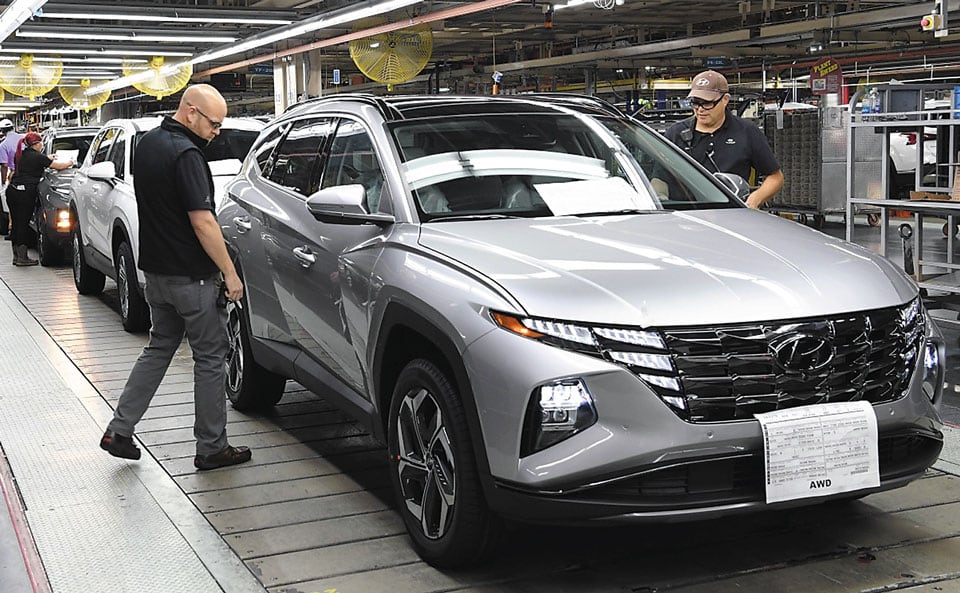
The South Korean automotive giant Hyundai Motor Group announced plans to pour $21 billion into the U.S. market over the coming four years, which includes constructing a new $5.8 billion steel facility in Louisiana, located in the southern part of the country.
On March 24, Hyundai Chairman Chung Eui-sun unveiled the company’s investment plan during an event at the White House with President Donald Trump and Louisiana Governor Jeff Landry. The corporation intends to invest $8.6 billion in automotive plants, $6.1 billion in steel production facilities, components, and logistical operations, and $6.3 billion in emerging technologies and power sources.
Hyundai’s declaration arrives only days prior to Trump implementing fresh reciprocal tariffs on trade allies. This action has increased speculation that other major South Korean corporations such as Samsung, SK, LG, POSCO, and Hanwha might also decide to take similar steps.
A few days prior, on March 21, Hanjin Group Chairman Cho Won-tae inked a deal to acquire aircraft and services valued at $32.7 billion from Boeing and GE Aerospace.
A high-ranking industry official stated, "While Hyundai and Korean Air are pursuing these investments from a business standpoint, they're also presenting what’s referred to as 'gifts' that align with Trump's interests." The same source added, “In light of this, several businesses are currently examining comparable strategies for investing in the United States, aiming to cultivate an advantageous commercial landscape during the nascent phase of the new government.”
The Hyundai Motor Group has been transferring production overseas, with this trend accelerating following the 1997 Asian financial crisis. Since finishing construction of its Asan plant in 1996 and Kia’s Hwaseong plant in 1997, Hyundai Motor hasn’t established any additional manufacturing facilities within South Korea for almost thirty years. Over time, the company’s domestic production capability has decreased as well. During the early 2010s, both Hyundai and Kia together could produce around 3.5 million cars annually; however, their current yearly output stands at approximately 3.15 million units due partly to South Korea’s limitation on working hours per week to 52.
The semiconductor industry, which forms the backbone of South Korea’s economy, is progressively expanding abroad as well. Samsung Electronics has committed more than $37 billion towards constructing two fabrication plants and an R&D hub in Taylor, Texas. Meanwhile, the SK Group plans to invest approximately $22 billion in Indiana and Georgia to establish a facility focused on high-bandwidth memory (HBM) packaging along with an electric vehicle battery production site.
LG has pledged $20 billion to construct a home appliance plant in Tennessee and a battery plant in Georgia. Hanwha has allocated $2.2 billion to build a solar module factory and acquire a shipyard in Philadelphia.
Together with Hyundai's contribution, South Korea's large business groups have committed over $102.2 billion in investments within the United States.
Such extensive investments aren’t confined to corporate giants shifting their activities to the United States. For instance, when Hyundai established an electric vehicle factory in Georgia, related entities such as Hyundai Mobis and various small providers of components—like brake systems, console units, and door assemblies—also relocated there. This move essentially transported the complete EV manufacturing ecosystem to American soil.
Although Trump’s protectionist trade policies impacted Hyundai’s investments, numerous Korean firms also cite Korea’s growing anti-business climate, stringent regulations, and powerful labor unions as significant factors driving their expansion overseas.
For example, the semiconductor industry has consistently sought waivers from the 52-hour workweek limit specifically for research and development activities; however, this proposal is still stuck in the National Assembly. Additionally, the Strict Liability Act for Major Disasters acts as an obstacle that pushes Korean enterprises abroad and discourages international corporations from investing in South Korea. There have also been minimal efforts to address calls for reforming high estate taxes, which are seen as a significant challenge for numerous businesses.
